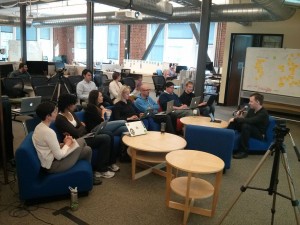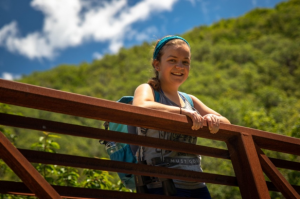By Mikala Jordan for EDRBlog.org

I thought I knew a thing or two about communication coming into the University of Utah’s City and Metropolitan Planning master’s program. Use active listening, practice dialogue rather than discussion: these phrases were ingrained in me from the handful of communications classes I took as an undergraduate student. In a class with two professors facilitating seven or eight students, communication seemed easy. Sure, there were moments of misunderstanding or disagreement; yet, these instances occurred rarely and were resolved quickly.
Then I moved to Utah for my master’s degree and began my foray into the world of dispute resolution. From one year of exposure to dispute resolution techniques, terms, and literature, I gained a working knowledge of another academic and professional discipline. To my surprise, I also learned what have proved to be valuable life skills. Here, I share my top five take-aways as a new member to dispute resolution.
1) “Conflict just is”
I heard Dr. Danya Rumore state that “Conflict just is” during the beginning of her Negotiation and Dispute Resolution class last January. She explained that conflict is not inherently bad nor good. The idea that conflict simply exists, and we humans attach—typically negative—judgement to it, blew my mind.
Going into the class, I disliked and feared conflict. When Dr. Rumore talked about conflict with us, her conceptual reframing clicked on the metaphorical lightbulb. I realized that conflict need not sit on a pedestal of dread. As Hermione wisely states in Harry Potter and the Sorcerer’s Stone: “fear of a name increases fear of the thing itself” (Rowling 237).
By expanding my understanding of the word and the concept of conflict, my reaction to real conflict changed too. While I practiced avoidance before, now I feel comfortable speaking up and stating that my experience or opinion differs. Much to my surprise, by voicing myself honestly yet compassionately rather than keeping my conflicting opinion to myself, coworkers and peers respect me more. They see the authenticity and individuality as a strength.
2) The power of a genuinely asked question
Could you explain why you feel that way? Will you tell me more about your family’s connection to the land? What scenario do you imagine that meets everyone’s needs? What do you notice regarding Place X that is done well, and where are areas of improvement? What would a successful collaborative process look like for this conflict?
Get notified when new articles are posted to the EDR blog – sign up for our email list »
While asking tons of questions is second-nature to professional facilitators, I have realized how rarely people utilize curiosity in daily conversations with each other. This is a shame – such questions can make all the difference. Number one, they convey concern and compassion. Listening to a speaker’s response shows genuine interest and understanding on a deeper level. Number two, questions bring out opinions necessary for a successful resolution. Without good questions, critical feelings can go unvoiced. Sometimes, these surface in a negotiation’s final moments and ruin all the consensus-building efforts done so far. In moments of uncertainty regarding another’s opinions or statements, asking a question is a safer option than offering a comment. All in all, a genuine question opens a conversation.
3) Which words? Choose carefully
I was familiar with the concept that what we say effects those around us. I think many people internalize this from the golden rule: just replace “treat others” with “say to others.” In watching Dr. Rumore facilitate regional collaboratives and classrooms, I observed a nuanced level to language that punctuated how much words matter and how even the smallest words matter.
One of the first lessons I learned regarded the dialogue deterring, collaboration collapsing word “but.” “But” can bring conversations to a screeching halt. When someone responds to the opinion you vulnerably shared with “but,” you know they did not listen well enough to find value in your comment. With their word choice, your reaction is geared toward rebuttal. Listening effectively to them becomes difficult.
Replacing the trouble-inducing three letters “b-u-t” with a different three-letter set changes the entire direction of a conversation. Once I started conjoining my sentences with “yes, and” instead of “but,” I observed conversation to continue where it would have deflated. Affirming that I listen and understand rather than unintentionally discrediting what I hear makes for more reflective, informative, and productive conversations.
4) Interest-based conversations allow for creative solutions
I learned about the theory of this concept long before I developed an understanding of it. People usually negotiate from positions. Positions, which are generally specific demands, leave little room for mutual-gains negotiation. Interests are the underlying and important reason behind the position. For instance, someone may argue positionally for an automobile-free street. Their underlying interest is the safety of the children who live on the street; they don’t just hate cars. When others understand their interest of the children’s well-being, solutions become possible that improve street safety without the drastic car ban.
Still, the theory seemed wishy-washy to me. Creative solutions – what does that mean? Then, in our class’ third dispute resolution game, several student groups mentioned that they added conditions to their negotiated agreements not stated in the game directions. These conditions, such as payment plans or flexible work scheduling, allowed negotiators to make mutual-gains agreements. Because the directions provided for unsatisfying possible agreements between the HR representative and new employee, students created their own. When students shared their negotiated agreements, the students who thought outside the box felt the most satisfied at the negotiation’s end. The creativity bred from their honest, interest-based conversations opened up exciting solutions.
5) Mentality matters
In The Art of Negotiation: How to Improvise Agreement in a Chaotic World, Michael Wheeler tells the reader to identify what emotional state she wants to be in when she finishes a negotiation. I realized this a skill that most athletes use: they visualize their performance from start to finish. That practice makes sense for athletes in individual sports in particular: a runner can imagine their leg muscles carrying them down the track or the wind blowing against their skin. However, I doubted the benefits of this practice for negotiations because human behavior is impossible to predict.
Yet, I gave Wheeler’s advice a try anyways. The benefits became clear, and they also made a lot of practical sense. If I want to feel calm, how should I behave and react during the negotiation to make that end state more likely? While hoping for an interaction to leave me feeling good seems obvious, conscious reflection helps center that end goal and thus guide my behavior during the negotiation. It’s another way to focus on my underlying interests and preferred outcomes. Do I want to feel frustrated, discredited, and anxious? Or, do I hope to feel calm, satisfied, and respected? The latter options sound much better to me, so, I should take a few minutes before a negotiation to reflect on them.
Looking back on my first year of dispute resolution, I learned many skills, but these five lessons stood out the most to me. Yet, the incredible thing about dispute resolution is the uniqueness of each dispute, and therefore the plethora of lessons to learn. This makes dispute resolution particularly exciting to me: I know I will gain important insights from each situation.

Mikala Jordan is currently a master’s student in the City and Metropolitan Planning program at the University of Utah. She works with Dr. Danya Rumore as an Environmental Dispute Resolution fellow, and was a University of Utah Global Change and Sustainability fellow during the 2018-2019 school year. She is spending the summer working as a long-range planner for the Greater Salt Lake Municipal Services District. Mikala hopes to use collaborative and innovative planning to work with gateway and natural amenity communities.
